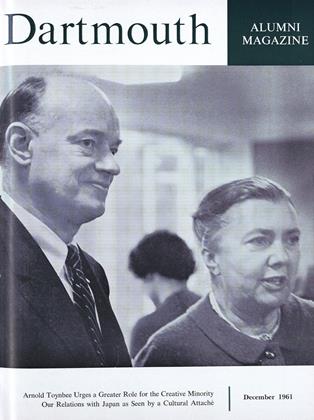By FredericA. Birmingham '33. New York: ThomasY. Crowell Company, 1961. 257 pp.$4.50.
I wish I could say that Mr. Birmingham's book is first class, but actually it seemed to me to be a very superficial account of the eight Ivy League schools. It is described as "a light-hearted reappraisal of all eight colleges." It might be of some value to parents who wish a press agent's release, but it has far too little depth in the descriptions of these schools, and far too little critical approach to the real purpose of these colleges ](which is, of course, education).
There are some good things in the book. I enjoyed reading Yale's Griswold saying (with which I agree): "No substitutes have been found for reading and writing." (I would also add: "or for thinking.") Also I was glad to read about Harvard which, on page 8 takes a courageous stand against the late Senator McCarthy. There were other things, too, about Harvard that I enjoyed, such as "Freedom, then, is the genius of Harvard," and, again, "Every educated man should know a little of everything and something well."
Having been forty years at Dartmouth, I can only say again that this book suffers from being written obviously from press releases, public relation brochures, etc. I think that Mr. Birmingham did not take sufficient time to write his book. He waxes lyrical over Dartmouth. For instance: ..
fanning out from it on all sides, until they are scattered on the hilly outskirts, are small colonial houses modest enough for a Thoreau - though, to be sure, sassy modern types have begun to crop up here and there." It would take a Sherlock Holmes to find any great number of colonial houses in Hanover today, though there are a few - such as the Howe Library and the Deke house - but most of them have gradually been torn down or moved away. And note this: "The Connecticut River ... rolls grandly past the college between banks crowded with great pines, each tall enough to mast a clipper ship." It is true that the river rolls past, but it can be seen only from a few windows in a new dormitory. Secondly, it is a polluted stream, unfit for humans or even fish. Most of the great pines were blown down in 1938 and few are tall enough today to "mast a clipper ship," if we had clipper ships.
I would have preferred a searching critique of the various curricula of these schools and an answer to the fears expressed by many that a real education is not possible today in any modern college.
 View Full Issue
View Full Issue
More From This Issue
-
 Feature
FeatureCULTURAL CATALYSIS
December 1961 By DONALD BARTLETT '24 -
 Feature
FeatureHas America Neglected Her Creative Minority?
December 1961 -
 Feature
Feature30,000 Dartmouth Men Are Her Friendsand Problems
December 1961 By CLIFFORD L. JORDAN '45 -
 Feature
Feature"AN OUTSTANDING FOUNDATION UPON WHICH TO BUILD"
December 1961 -
 Class Notes
Class Notes1956
December 1961 By STEWART SANDERS, JAMES L. FLYNN -
 Class Notes
Class Notes1930
December 1961 By WALLACE BLAKEY, HENRY S. EMBREE, JOHN F. RICH
HERBERT F. WEST '22
-
 Article
ArticleHanover Browsing
April 1937 By HERBERT F. WEST '22 -
 Article
ArticleHanover Browsing
March 1938 By HERBERT F. WEST '22 -
 Article
ArticleHanover Browsing
November 1940 By HERBERT F. WEST '22 -
 Books
BooksSOME EARLY AMERICAN WRITING BOOKS AND MASTERS
October 1943 By Herbert F. West '22 -
 Article
ArticleHanover Browsing
February 1944 By HERBERT F. WEST '22 -
 Article
ArticleHanover Browsing
May 1952 By HERBERT F. WEST '22







